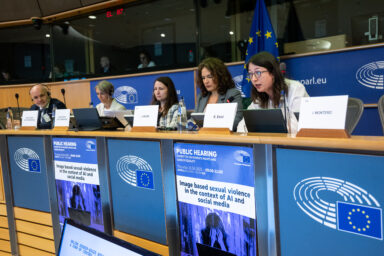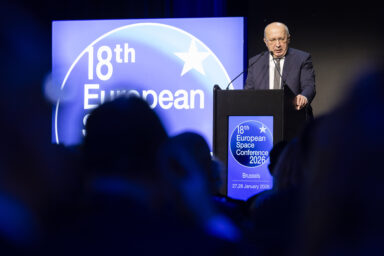The European Parliament is taking action on a new frontier in online extremism, the so-called ‘manosphere’: a constellation of online communities promoting hostility toward gender equality. Lawmakers and experts warn that what began as niche forums about men’s issues has morphed into a transnational pipeline of misogyny, conspiracy and political radicalisation that now reaches deep into Europe’s democratic debate.
The warning came during a joint session of the Parliament’s Committees on FEMM (Women’s Rights) and the EUDS (European Democracy Shield), held as part of Gender Equality Week 2025. Experts warn MEPs that the manosphere’s influence stretches far beyond internet subculture. It already fuels social polarisation, sows distrust in institutions and, increases offline violence.
From men’s struggles to digital radicalisation
The manosphere is described as a network of blogs, podcasts and online forums claiming to speak for men’s struggles. This includes dating, fatherhood, fitness or employment. However, it often veers into hostility toward women and feminism. Within these spaces, masculinity is narrowly defined through dominance, material success and emotional detachment. But feminism is cast as the source of male decline.
The ecosystem thrives across social media, gaming platforms and dating apps. It takes advantage of algorithmic recommendation systems to draw the attention of young men searching for belonging or advice. What starts as self-help content can slide toward resentment. Usually, it ends in blaming women for economic frustrations or promoting aggression as a marker of strength.
At the extreme of this spectrum sits the incel community. It is short for “involuntary celibate”. The members claim they are denied intimacy by women and that society unfairly privileges female power. The ideology has been linked to several acts of mass violence across North America and Europe. It’s the case of the 2014 Isla Vista killings in California, the 2018 Toronto attack, and a 2020 shooting in Plymouth, UK.
You might be interested
Radicalisation in plain sight
New data presented to Parliament by the CCDH (Centre for Countering Digital Hate) shows how popular and organised these online subcultures have become. They found that the largest English-language incel forum attracts around 2.6m visits every month, hosting over 17k registered members. Nevertheless, only a few hundred “power users” drive most of the content.
In the words of CCDH researcher Laura Kaun, they found “ a community with malignant social dynamics encouraging users to worse and worse extremes”, she told MEPs. “Posts were awash with misogynist, racist, antisemitic and homophobic language”. Her team analysed more than one million posts over 18 months and found misogyny deeply woven into the community’s fabric. Posts about rape appear every 29 minutes, with nearly nine in 10 being supportive of sexual violence. Hate speech appears in one out of every five posts, including misogynistic, racist, and homophobic slurs.
Ms Kaun identified three main pathways drawing users into these communities: body image, unemployment and suicide forums. She noted that some of the forums explicitly ban women and warned that the network has been linked to “dozens of suicides and at least one mass shooting”.
Forum members are as young as 15. They express violent extremist views, and the network is linked to dozens of suicides and at least one mass shooting – Laura Kaun, CCDH
Although the forums are English-language, nearly one in five users is based in the EU. Among these, the traffic concentrated in Poland, Sweden, Germany and Spain. Roughly half of all external links shared on the site lead to mainstream platforms like YouTube, TikTok, Reddit and X. This reveals how easily users move between mainstream and extremist spaces. Her report calls on governments and platforms to derank incel sites in search results, deplatform extremist YouTube channels, and address the digital harms driving boys into extremist communities.
Gender as a weapon of information warfare
For Kristina Wilfore, Director of Innovation and global projects of Reset Tech, the phenomenon is part of “gendered information warfare”. She described it as a war tactic “used by authoritarians to target young men in the EU across Europe. Authoritarian actors are weaponising gender to divide societies and weaken democratic resilience”. This new type of attack replaces traditional weapons with manipulation at the level of ideas.
As Ms Wilfore explained, authoritarians no longer need “tanks or missiles” to destabilise societies. Instead, they deploy “falsehoods and algorithms that exploit familiar themes, protecting families, defending women, preserving traditional values”. These narratives are designed to look organic, but in reality, they mask coordinated campaigns of psychological and information warfare to divide communities and weaken trust in democratic institutions.
Wilfore warned that attention-driven business models of major US tech platforms amplify polarising gender content for profit. She said this “extreme masculinity ecosystem functions as a pipeline,” starting with “aspirational self-help, fitness and dating advice”, then “injecting grievance,” and finally “monetising loyalty through scams and distortions”.
National defence needs to focus more on browsers, not just borders – Kristina Wilfore, Rest Tech
Wilfore urged MEPs to use the Digital Services Act as part of Europe’s democratic defence. She recommended that gendered manipulation be classified as a systemic risk under the DSA, that recommender systems be audited for amplification of anti-democratic gender content, and that a European rapid-response network support women leaders, journalists and civic actors facing online attacks.
“Unless Europe wants to give up its territorial integrity to American companies”, she concluded, “national defence needs to focus more on browsers, not just borders”.
A divided house
The hearing laid bare a familiar divide in Parliament. On one side, those who see online misogyny as a security threat. On the other, those who frame it as a question of free expression. What began as a discussion on digital radicalisation quickly turned political, exposing how gender debates mirror deeper fractures over the EU political groups.
From the centre groups, MEPs argued that gendered disinformation is undermining Europe’s democratic fabric. MEP Lena Düpont (EPP/DEU) called the Digital Services Act “part of our security architecture”. She pointed to Moldova’s response to gendered disinformation and more “digital-security training” across political life. In a similar tone, MEP Marit Maij (S&D/NED) warned that the backlash against equality was “not only online” but visible “here in this Parliament”, where terms such as “gender equality” and “intersectionality” are increasingly contested.
However, the far right pushed back. MEP Margarita de la Pisa Carrión (ECR/ESP) accused feminism of creating “tensions and victims”. For her, it “accuses rather than looks at harmony and equality between men and women”. Her defence of traditional roles drew applause before the chair intervened. As well, MEP Christine Anderson (ID/DEU) dismissed the debate as alarmist, saying Parliament was treating the so-called manosphere as though it threatens democracy itself. Silencing men, she warned, would “drive it underground and make it even angrier”.











